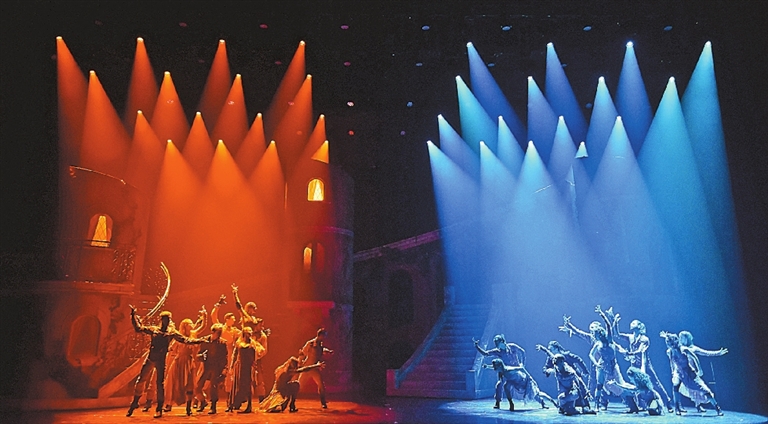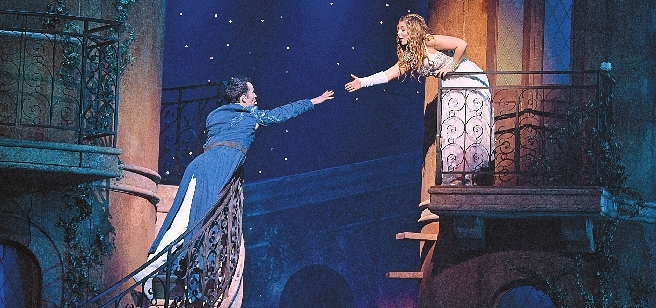

Wenjin Liu wenjin.liu.22@dartmouth.edu NO other adaptation of Shakespeare’s “Roméo and Juliet” resembles a duel between ice and fire as well as the French musical “Roméo and Juliette: de la Haine à l’Amour” (“Roméo and Juliette: From Hatred to Love”). With music and lyrics by Gérard Presgurvic, it has become a global phenomenon that has fascinated audiences of different backgrounds since its debut in 2001. The musical narrates the tragic story of a pair of star-crossed lovers, Roméo and Juliette. The two fell in love despite coming from the Montague and the Capulet respectively, two families that are sworn enemies. Regardless of the feuding hatred, Roméo and Juliette get married in secret but die for each other by the story’s end due to a misunderstanding. The French adaptation was first introduced in China in 2012 and was performed in Shanghai 20 times. From there, it grew more popular with Chinese audiences. Returning in 2016, the musical staged 30 shows in Guangzhou and Beijing. In 2018, it went on a 38-day tour in China that swept across Shanghai, Shenzhen, Tianjin and Hangzhou. This summer, the musical was brought to China for the fourth time and is embarking on a two-month tour, having been staged in Beijing, Xi’an, Nanjing and Shenzhen. At the Nanshan Cultural and Sports Center, it was welcomed by Shenzheners with greater fervor than it was last year. Starting July 12, the performance went on a one-week stretch ending last Thursday. Some minor characters in the play, such as Benvolio, Mercutio and Tybalt, are enriched in the adaptation. While Juliette’s cousin Tybalt performs more soliloquies and shows more inner feelings through solo songs, Benvolio and Mercutio, Roméo’s friends, form an inseparable trio with Roméo in this version. Benvolio even acts as narrator of the musical. One important distinction that separates the adaptation from the original Shakespeare play is the evolutions it has undergone over time. While the ancient play has stayed the same for centuries, the musical has undergone some drastic changes over the last two decades, according to Cyril Niccolai, who plays Benvolio in the musical. “The first version of the show in 2001 was very different from the show today,” Niccolai told the Shenzhen Daily in an interview. “We have done some tweaking along the way; some songs get out, some new songs came in. It’s just Gérard likes it this way: Whenever he feels like we can do better, he changes it.” For instance, the stage setting of the musical in 2001 was spread out around a two-story structure where most of the singing and dancing took place. When Roméo came to find Juliette during the “balcony scene,” he climbed up to the second floor with bare hands while singing “Le Balcon.” However, in later productions, including this year’s, the stage is set up around multiple separate fortresses with spiral stairs and a giant ramp in the background. Instead of climbing up the wall, Roméo takes the stairs to meet Juliette on the balcony. Another difference between this year’s production and the initial version is how the song “Tu Dois Te Marier” is featured. In the original version, the song was performed in an animated style as the Capulet family urges Juliette to accept her arranged marriage. In recent productions, the same song takes on a miserable atmosphere as Juliette’s mother demands her daughter to marry while recalling her own misfortune. The choreography of this scene also mimics the helplessness of Juliette’s mother: As she cries out in anguish, the two dancers, one representing Juliette and the other representing her mother, dance to the desperation exuded in the song as their fiery red dresses sparkle on stage. Apart from the changes in the sets and songs, the characters’ interpretation of their roles also adds to the musical’s evolution. According to Nicolas Turconi, who plays Tybalt in the show, how he embodies his character changes depending on energy and other factors. “I’m always trying to renew myself,” Turconi said. “It depends on the energy of the day. If I’m tired or not, I try to change my character every day and I’ve discovered some new feelings. If I was doing the exact same stuff every day, I would be bored.” However, to Clémence Illiaquer, the actress who plays Juliette, the constancy of holding on to and heightening some of the most important qualities of the character is her method of best presenting Juliette. “What I’ve captured from Juliette is her innocence and purity,” she said. “So I try to magnify these two features when I’m acting this young character.” The differences between cast members, which bring new dynamics for collaboration to the team, also mean a change in the show for the actors. For Damien Sargue, the protagonist of the musical who acts as Roméo in the 2001 and recent versions, working with this year’s cast is a familiar but at the same time new experience. In 2018, he returned to the stage to play Roméo and went on the China tour. According to him, being back feels like home. “I’m happy to meet the cast and go back on stage,” Sargue said. “It is easy to fit in here, and it feels like a family.” According to John Eyzens, the actor playing Mercutio, the return of Sargue feels like “fresh air” to him. “When Damien came back, my Mercutio was renewed, and he came with new energy.” Eyzens said. “It was like a new creation. Every time we have new characters, our old characters change.” The refined details of the musical can account for the show’s enduring fame. The exquisite dance sequences, some of them involving difficult acrobatics, have mesmerized audiences. Together with the diverse music sets, which vary between elegant, classical dance instrumentals and modern songs with electronic elements, “Roméo and Juliette” is a sensational show to behold. Another reason for the musical’s global recognition is the grand, unifying themes that have remained unchanged throughout almost 20 years, such as the undying love between Roméo and Juliette and the carefree but loyal friendship between the Montague trio. All of these ordinary emotions that exist in our daily lives are magnified and sublimated through the actors’ passionate performances, which makes the show more relatable to the audience. The story of Roméo and Juliette may have ended with the two hostile families being reconciled by their children’s deaths, but the feud between them on stage will continue in the scarlet red of the Capulet and the bright shades of blue of the Montague. Ultimately, perhaps nothing else can explain the musical’s long-lasting popularity better than Niccolai’s account of the show. “We’re lucky because the story and music that Gérard has created are strong enough,” he said. “It’s very easy to find a part because the songs and the story are so good.” “Roméo et Juliette” is heading to Suzhou (July 24-28) and Guangzhou (Aug. 2-4) before rounding up in Hong Kong (Aug. 9-11). | 
